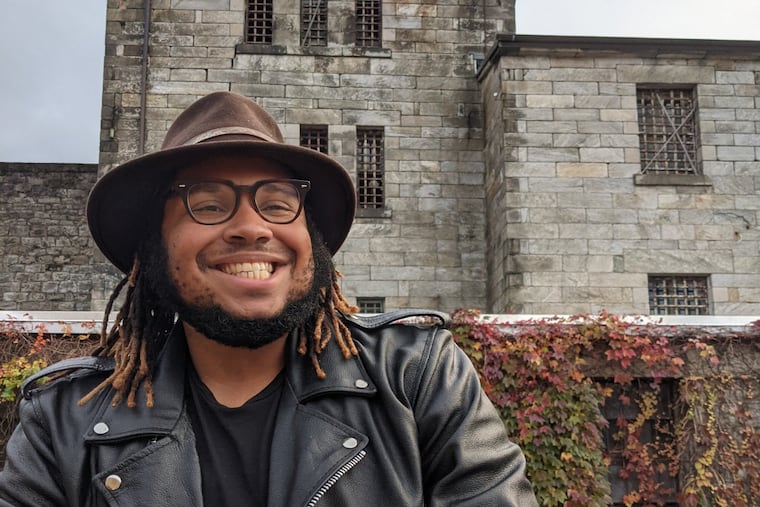Philly’s Black Republican ward leaders: ‘I know it’s an uphill battle, but my role is to engage’
Tyler Ray, Talmadge Belo, David Rose and Calvin Tucker talk to The Inquirer about why they are Republicans in an overwhelmingly Democratic city.

When Tyler A. Ray turned 18, he registered to vote. But Ray, living in North Philadelphia, was deeply disturbed by the poverty, crime, and plethora of chronic health issues that surrounded him.
“I began to question why do we live in these conditions, and who are the leaders in charge?”
The second question is the easier one to answer.
Since the 1950s, Philadelphia has been a one-party town where Democrats have roughly a 7-1 edge in terms of registered voters. This means for local elections, the Democratic primary is the true source of political activity, leaving anticlimactic general elections.
According to Talmadge Belo, a former Black Republican ward leader from North Philadelphia, the last big electoral upset for Republicans was the ouster of a powerful Democratic incumbent city councilmember from the 5th District and the election of Ethel Allen. She was a Republican African American and the first woman to serve on City Council.
But that was 1971.
Ray registered Republican almost half a century later, becoming one of the few Black Republicans in Philadelphia.
“I would see fliers, banners, window signs for Democratic candidates, and always wondered why I never saw Republican representation in North Philadelphia,” he said. “I have great love for my community but could never for the life of me understand why the people would continue to vote for either the same politicians, or vote for the same party over and over under the same conditions, and never give the other side of the aisle a chance.”
At 21, Ray became a Republican ward leader at the behest of Daphne Jenkins Goggins, a Republican ward leader in Nicetown-Tioga who stepped down from her post in 2018 to challenge Mayor Jim Kenney.
Her agenda was aligned with the national GOP and President Donald Trump. She opposed “sanctuary city” status and the sugary-beverage tax and supported school choice and lower taxes on businesses. She became the Republican Party’s first endorsed African American candidate for mayor in the city — for a month.
Republican ward leaders reconsidered the endorsement and Jenkins Goggins, now deceased, withdrew, complaining, “The Philadelphia Republican Party is not ready at this time to support a minority candidate. They have no plan on how to embrace and move into the minority community.”
“It’s not easy being an effective ward leader in North Philadelphia, being that almost 99% of registered voters in North Philadelphia are registered as Democrats,” Ray said, adding, “I would say that 85 to 90% of them are completely dissatisfied with the leaders of the city, but they still cannot find it within themselves to register Republican.”
David Rose of Strawberry Mansion has become a Republican leader of the 32nd Ward because of dismay with the Democrats’ inability to solve the problems. “Young people know that Democrats don’t care about them. It’s more like psycho-emotional abuse.”
Being a Black Republican was once the norm. The party of President Abraham Lincoln was considered the more humanitarian option as freed enslaved people exercised their right to vote.
“Many Black Republicans were attracted to the Republican Party because of the corruption in the Democratic Party. It was almost a protest vote against the Democratic Party,” explained Joshua Farrington, author of Black Republicans and the Transformation of the GOP, and an American history professor at Bluegrass Community & Technical College in Kentucky.
As the 1960s saw African Americans move almost en masse to the Democratic Party, attracted by the social programs of President Lyndon Johnson and repulsed by the politics of Richard Nixon’s Southern Strategy to appeal to Southern Democrats, Farrington said noted Black Republicans, such as Jackie Robinson, would warn about “putting all your eggs in one basket.”
“As Martin Luther King said, we are integrating, but we are integrating into a burning house,” Rose said.
For half a century, Belo has been a registered Republican and for many years he was head of his ward. Today the ward has no leader, and only Belo and his daughter are listed as committee people. “And I had to push her to do it,” he said.
In an effort to rebuild, the Republican National Committee has opened the Republican Engagement Center in Germantown with a focus on attracting the African American community.
For 22nd Ward leader Calvin Tucker, being the state GOP deputy chairman and director of engagement and advancement makes him the highest appointed Republican in the state. He pointed to the recently opened Republican Engagement Center in Germantown and the 4% increase in Black support for Trump between his first and second elections as a sign that the Republican Party is serious about increasing the number of minority voters.
“I may not have the registration edge, but if I have various candidates they can support, that’s a win.”
“I know it’s an uphill battle, but my role is to engage,” he said. “I may not have the registration edge, but if I have various candidates they can support, that’s a win.”
He also said the real concern for elected officials of either party is the ability to solve issues. Crime, unemployment, wealth and health disparities, and poor public education are the arguments the Republican Party is using to move minority voters to the Republican side.
Of the 66 wards, Democrats have no ward leader vacancies, but almost one out of four Republican wards are without anyone in the top spot. Tucker denies the engagement center is a replacement for a weak ward structure, calling it a “supplement.”
“Being that the Republican Engagement Center is in a working-class, predominantly Black neighborhood in Germantown, it is a step to acknowledging who the voting base is, and what the actual concerns are by physically being in the inner city,” Ray added.